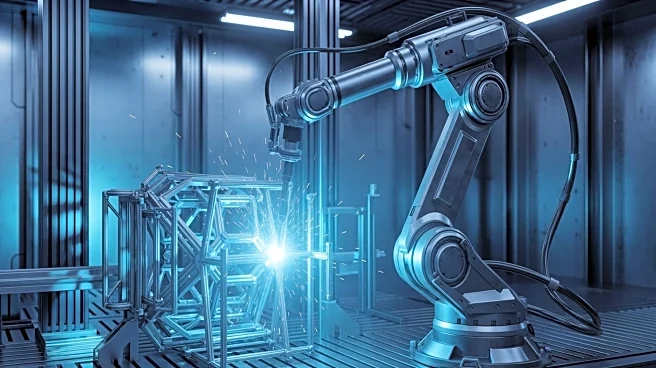What's Happening?
QuoteIQ, a software company, is positioning itself to empower skilled trades workers as Nvidia CEO Jensen Huang predicts a significant increase in demand for electricians, plumbers, and carpenters. Huang forecasts
that the construction of data centers for AI will require hundreds of thousands of skilled workers, emphasizing the importance of blue-collar jobs in the future economy. QuoteIQ aims to support these workers by providing technology that enhances their productivity and efficiency, such as tools for instant quoting, intelligent scheduling, and route optimization. This development comes as global capital spending on data centers is expected to reach $7 trillion by 2030, highlighting the critical role of tradespeople in building and maintaining AI infrastructure.
Why It's Important?
The anticipated boom in demand for skilled trades workers has significant implications for the U.S. economy and labor market. As AI technology continues to evolve, the need for physical infrastructure to support it grows, creating job opportunities in sectors that require human expertise and physical presence. This shift challenges the narrative that AI will primarily replace jobs, instead highlighting its role in enhancing certain professions. The focus on empowering tradespeople with advanced technology could lead to increased productivity and job satisfaction, while addressing current labor shortages in construction and manufacturing. This trend also offers financial opportunities for younger generations entering the workforce without the burden of student debt.
What's Next?
As the demand for skilled trades workers increases, companies like QuoteIQ are likely to expand their offerings to further support these industries. The focus will be on developing technology that reduces administrative burdens and maximizes efficiency, allowing workers to handle more jobs without extending their hours. Additionally, educational institutions and training programs may adapt to prepare more individuals for careers in skilled trades, recognizing the growing importance of these roles in the economy. Policymakers and industry leaders may also need to address potential labor shortages and invest in initiatives that attract and retain workers in these critical sectors.
Beyond the Headlines
The emphasis on skilled trades in the AI-driven future raises ethical and cultural considerations about the value of blue-collar work. It challenges societal perceptions that prioritize white-collar jobs and higher education, potentially leading to a reevaluation of career paths and economic contributions. This shift could foster greater appreciation for tradespeople and their essential role in technological advancement, while also prompting discussions about equitable access to training and resources for these professions.











